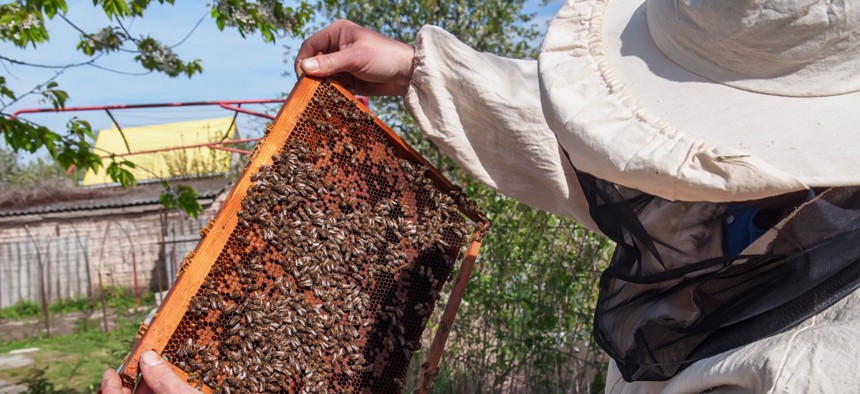Why State and Local Governments Should Care About Honeybee Swarms

It’s the season for honeybee swarms. Here’s what state and local governments say you should do if you spot one.
A swarm of honeybees is an unforgettable sight.
Thousands of bees follow their queen and depart from their hive en masse with the goal of forming a new colony. While scouts search for a suitable home—somewhere dark, enclosed and safe—the rest of the group temporarily attach themselves to whatever they can grab onto nearby. In many cases that place is a tree branch or bush. In more problematic and rare instances, man-made objects—like this bike in Chicago, or this car in Wales—have been co-opted as a swarm pit stop.
While they wait for scouts to report back on potential nesting sites, the bees cluster around their queen and form a clump so tight they almost appear to become one fluid being. The swarm thrums and pulses with an incredible energy.
To the lay-person, this may be a terrifying thing to behold. Many people are disturbed by the sight of a solitary bee, now imagine tens of thousands of stinging insects buzzing and crawling over each other in a basketball-sized clot.
It may seem like the stuff of nightmares, but as a hobbyist beekeeper, the sight of a writhing swarm of bees fills me with joy.
First, honeybees—which are already far more docile than wasps—are not particularly aggressive when they swarm. The protective instinct of a honeybee is mostly driven by their hive and their brood (baby bees). A swarm is by definition a hiveless colony, and therefore, while swarming, these bees have less to defend.
Secondly, before they swarm, bees guzzle honey to sustain themselves for the journey. As a result of a fun trick of anatomy, bees with full stomachs have a harder time getting their stinger in the correct position to sting.
Honeybee swarms are sometimes so docile that they can be moved—by experienced beekeepers, don’t try this at home—with bare hands.
There’s another reason a swarm sighting fills beekeepers with glee. It can cost upwards of $150 to buy a colony of bees, while a swarm is completely free.
Putting economic issues aside, a honeybee swarm is also a fascinating case study in political science.
Researchers have likened the process by which a swarm chooses its new home to a surprisingly egalitarian democracy. Individual scout bees return to the clump on the branch (or car) they are using as a resting place, and communicate the merits of the nests they have found. Each scout “lobbies” for the location of her choosing, and the swarm doesn’t move until somewhere around 80 percent of the scout bees in the swarm agree on their new home. It’s a remarkable form of collective decision-making. (For more information, read the amazing Honeybee Democracy).
In another case of the political and entomological worlds colliding, state and local governments have a lot to say about bee swarms. As well they should. Too often the sight of a swarm results in someone calling the exterminator, rather than a local beekeeper.
Honeybees are a struggling species. And swarms, if handled with care, may become new productive colonies that will serve as much-needed pollinators for local flora. Pollinators, like bees, help at least 30 percent of the world’s crops and 90 percent of the world’s wild plants thrive.
Many state and local governments provide a very useful service by connecting the people who find a swarm, wherever it might be, to a beekeeper who knows what to do about it.
For example, the Indiana Department of Natural Resources has a very handy interactive map that lets you click on individual counties to find the name and contact information for people who volunteer as swarm collectors. The Arkansas State Plant Board also lists the beekeepers for swarm collection in each of the state’s counties.
The Tennessee Department of Agriculture has a list of questions that a potential swarm collector may want to ask the person reporting the swarm, including a question about what the cluster looks like, “you do not want yellowjackets or hornets,” the site reads.
Miami-Dade Fire Rescue takes a similarly cautious tone, in their case, regarding the risk that a swarm may be Africanized. While still rare, many parts of the United States have seen instances of colonies of hybrid European/African bees that display much more aggressive behavior.
In some cases, the message of what to do about a swarm is a bit more muddled. In the city of Chandler, Arizona there appears to be a different protocol recommended for bees found in parks than for bees found near utility boxes or fire hydrants. And rather than connect citizens with beekeepers who can help, the site’s official recommendation is simply to Google humane bee removal.
Given the scarcity of honeybees—and pollinators in general—and the vital role these creatures play in helping with the production of much of the food we eat, even more state and local governments should take it upon themselves to educate their citizens about what to do if they spot a honeybee cluster.
Call a beekeeper, save a swarm.
Quinn Libson writes for Government Executive’s Route Fifty.
NEXT STORY: Michigan Sees Jump in Motorcycle Crash Deaths; Connecticut Is America’s ‘Tailpipe’






